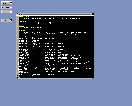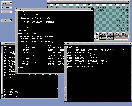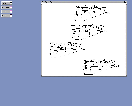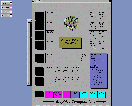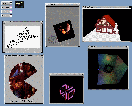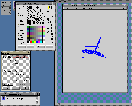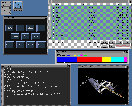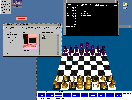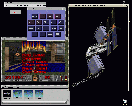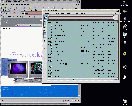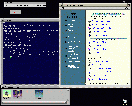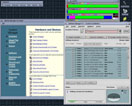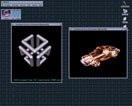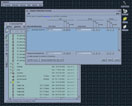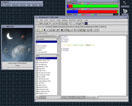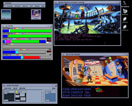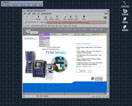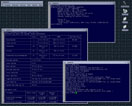IRIX Introduction
Brief History
The first operating system developed for SGI systems ran on the IRIS line of terminals and workstations based on Motorola CPUs (see GL2 history). When the MIPS based IRIS 4D systems were introduced the 4D1 operating system accompanied these computers.
The earliest common version is 4D1-3.0 (1988). IRIX 3.x was based on UNIX System V Release 3 with 4.3BSD enhancements, and incorporated the 4Sight windowing system, based on NeWS and IRIS GL.
The next major version (4D1-4.0) was introduced in 1991. SGI replaced 4Sight with the X Window System (X11R4), using Xsgi and the 4Dwm window manager providing a similar look and feel to 4Sight.
When the next version was introduced, the name IRIX was more widely used. IRIX 5.0, released in 1993, incorporated certain features of UNIX System V Release 4, including ELF-format executables. Later on in the IRIX 5 lifecycle the XFS journaling file system was introduced.
Beginning with IRIX 6.0, released in 1994 during the IRIX 5 era, full 64-bit support was added. After a few platform specific releases with IRIX 6.5 the last "major" all platform release was introduced.
The last IRIX release is IRIX 6.5.30, introduced in August 2006. The IRIX product line was discontinued after this version, according to the press release dated September, 6th 2006 support for IRIX will continue at least until December 2013.
Main Versions
Introduction
To decide which IRIX version is suitable for a system it is important to know specific information about the computer itself:
- Which system family is it (O2, Indy, Origin 2000, ...)?
- Which processor is installed?
- Which graphics hardware is in it (if any)?
- Are there options that require specific drivers?
Another thing to note is that there are platform specific releases, that were made when some new hardware was introduced. These usually don't support all hardware that was available at the time.
This chapter will go on with an introduction to most important all platform IRIX releases. It will conclude with a paragraph containing some considerations and recommendations for the choice of ann appropriate IRIX version.
Major Versions
Of all IRIX releases the following are the most important:
- IRIX 5.3
- IRIX 5.3 was the last IRIX version to include support for systems with R3000 CPU. So this is the most recent operating system that can be installed on 4D era systems (Personal Iris, PowerSeries and so on).
- IRIX 6.2
- Of the 6.x releases IRIX 6.2 was the first release that did support all current hardware of it's time. Although all of this hardware (except the Crimson) is still supported in the current 6.5 releases IRIX 6.2 can still be a reasonable choice for lowend configurations of Indigo, Indigo 2 or Indy (pre 1996).
- IRIX 6.5.22
- This version is the last to support many of the popular Silicon Graphics classics like the Indigo 2 or Indy which are equipped with R4x00 microprocessors..
- IRIX 6.5.30
- IRIX 6.5.30 is the final IRIX release and is suitable for any of the last Silicon Graphics systems that were equipped with MIPS microprocessors (O2, Octane, Fuel, etc.).
Operating System Considerations and Recommendations
The following list starts with current systems and goes back to the early IRIS 4D days (for hardware information go to the systems page. In a similar fashion for all the listed systems the most recent operating system will be named, followed by exceptions that make it neccessary to choose an older version.
- O2, O2+, Octane, Octane 2,Fuel
- All of these systems can run a current IRIX 6.5 release.
- Origin 200, Origin 2000, Onyx 2, Origin 300, Onyx 300,Origin 3000, Onyx 3000
- All of these systems can run a current IRIX 6.5 release.
- Indigo 2, Challenge M
- All Indigo 2 / Challenge M can run IRIX 6.5 up to 6.5.22.
- RAM < 64MB: IRIX 6.2
- CPU R4000/100: IRIX 6.2
- Indy, Challenge S
- All Indy / Challenge S can run IRIX 6.5 up to 6.5.22.
- RAM < 64MB: IRIX 6.2
- CPU R4000PC, R4600PC: IRIX 6.2
- Challenge, Onyx
- All of these systems can run IRIX 6.5 up to 6.5.22.
- Indigo
- Indigo with R4x00 CPUs can run IRIX 6.5 up to 6.5.22.
Indigo with R3x00 CPUs are limited to IRIX 5.3. - Crimson
- All Crimson systems can run up to IRIX 6.2, with the following exception:
- GTX graphics: IRIX 5.3 (last version to support GTX)
- PowerSeries
- All of these systems can run up to IRIX 5.3.
- Personal Iris
- All of these systems can run up to IRIX 5.3.
- Professional Iris
- All of these systems can run up to IRIX 5.3, with the following exception:
- G graphics: IRIX 4.0.5 (last version to support G graphics)
Pictures
IRIX Media / Media Kits
Developer Toolbox
Support Advantage
Indyzone
Other
IRIX 3.3 Screenshots
IRIX 4.0.1 Screenshots
IRIX 5.3 Screenshots
IRIX 6.5 Screenshots
Cyclone Software
Links
Technical Reports and White Papers
- IRIX 6.1 Technical Report [local copy]
- IRIX 6.2 Technical Report [local copy]
- Cellular IRIX 6.4 Technical Report [local copy]
- XFS White Paper [local copy]



























